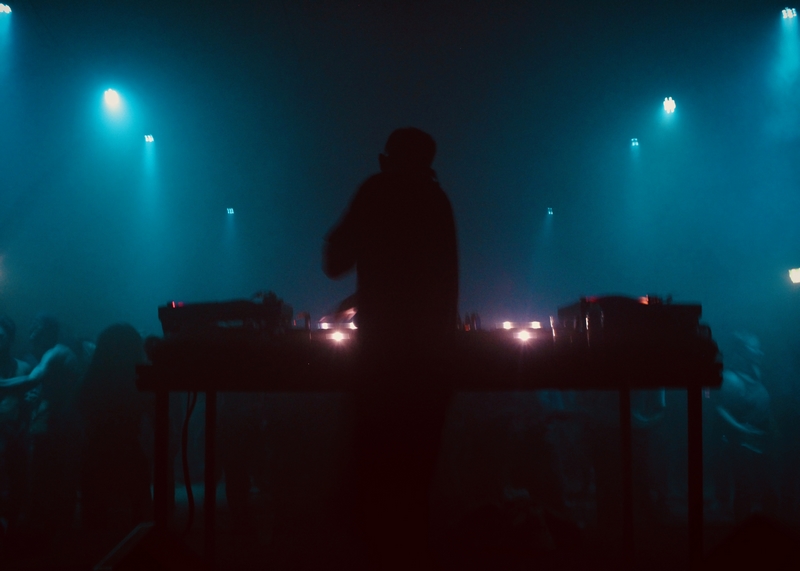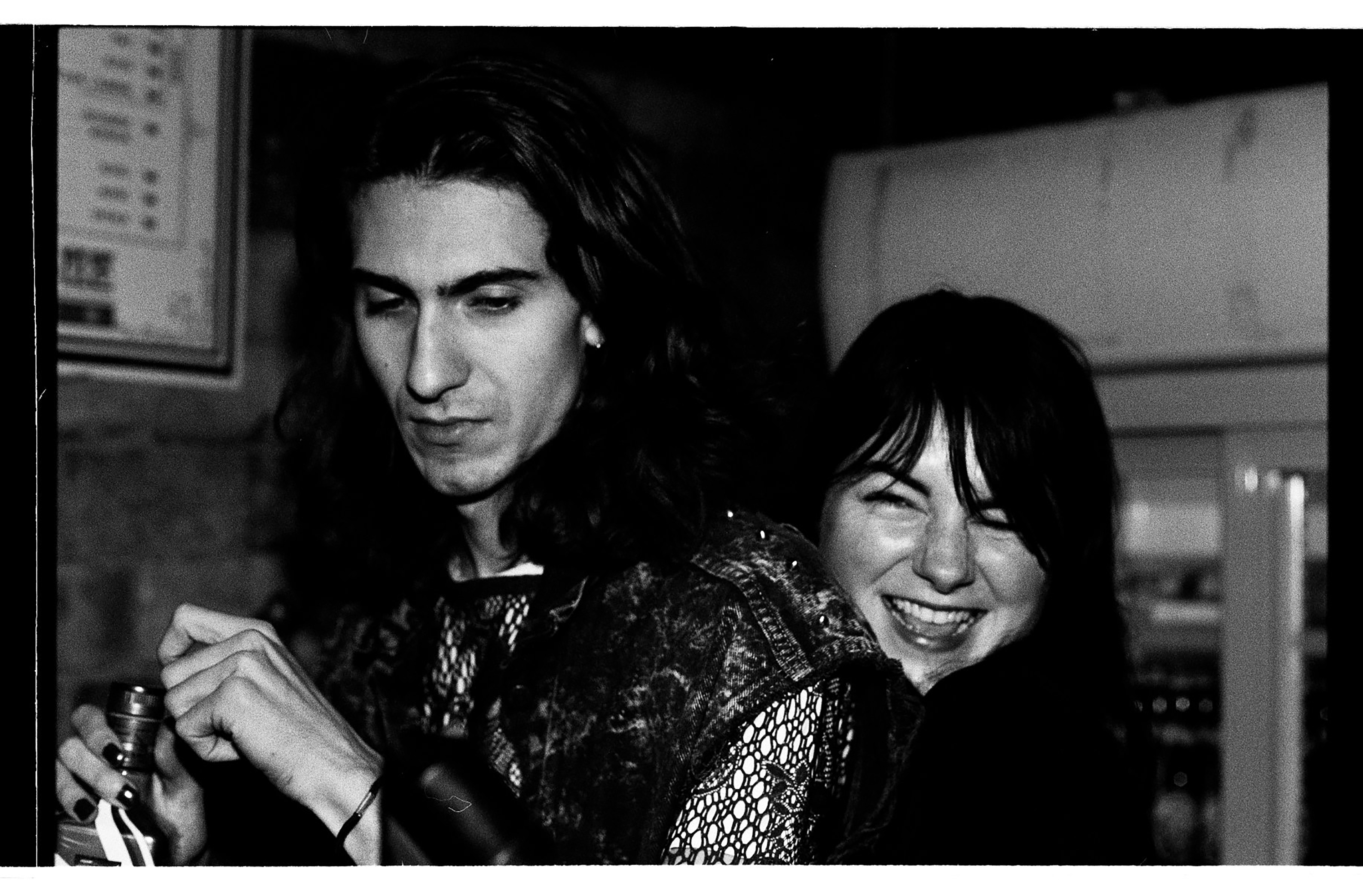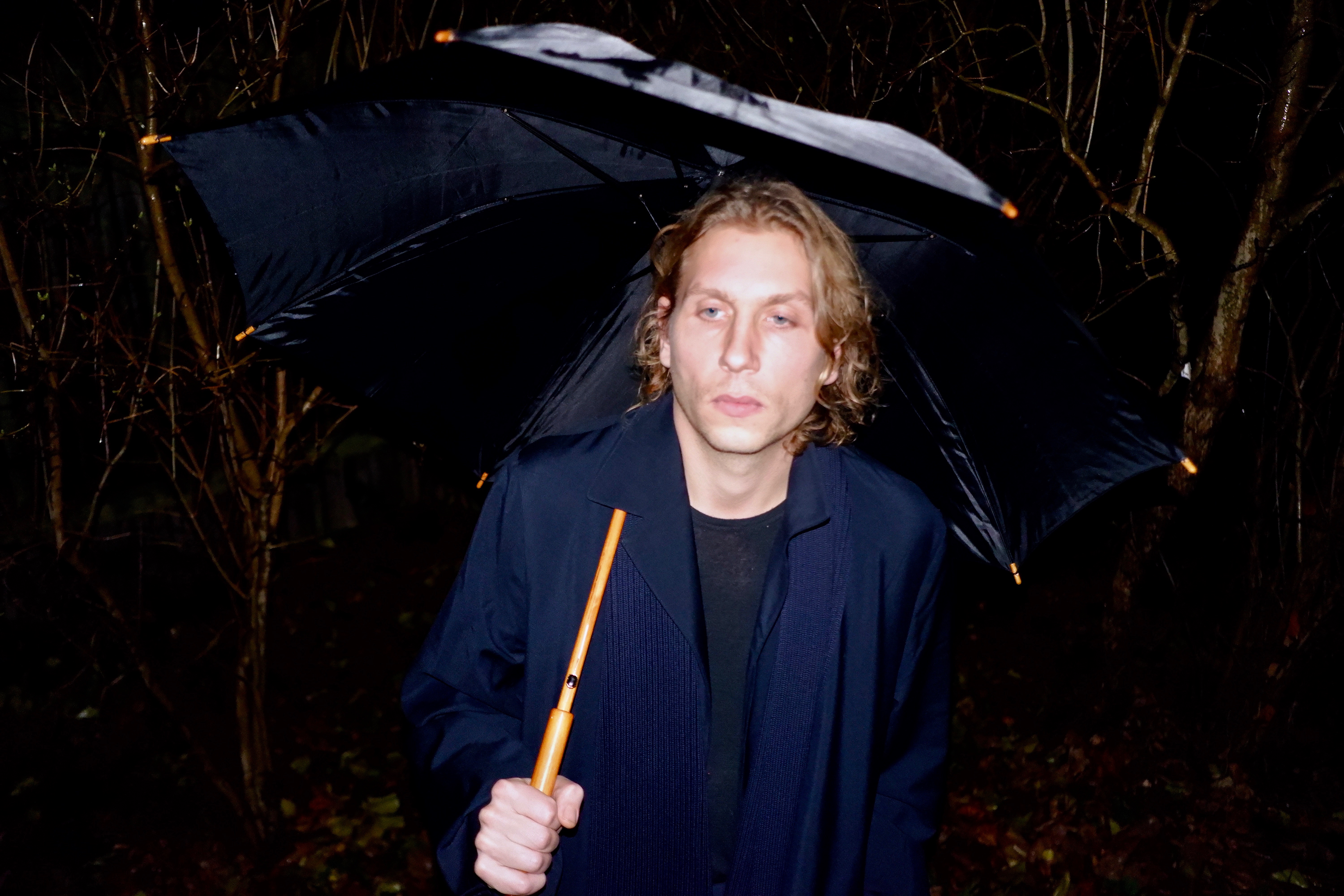Lost Lands Festival 2018 – Partying and experimenting with the apocalyptic hippies (live report)
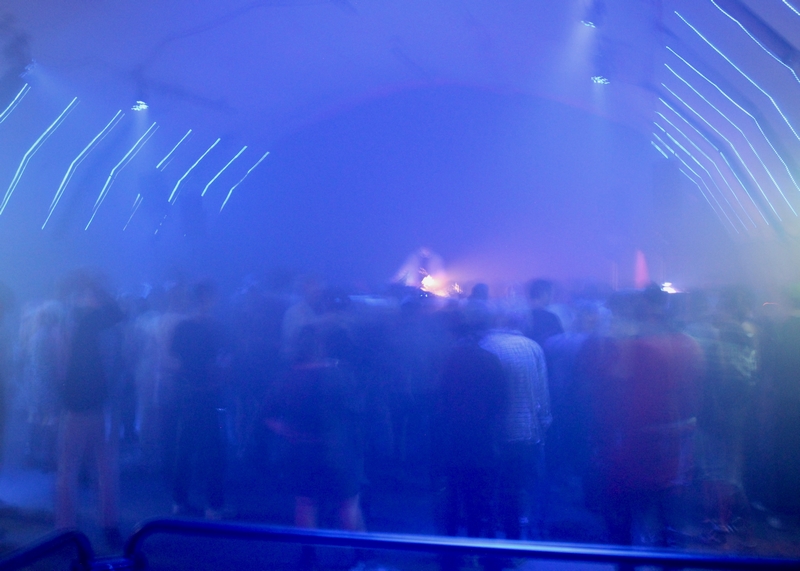
Lost Lands Festival, Copenhagen, August 17-18 – review by Wieland Rambke, photos: Cameron Pagett
For its third installment this year, Lost Lands seized the grounds of a small space on Copenhagen’s Refshaleøen and transformed it into a magical clearing. Approaching the festival a day before it started, the first thing I saw was the shape of a rusty boat hall, lying in the landscape like an enormous metal bug. It turned out to be the indoor stage, where half of the concerts where held.
Outside again, I came upon a yard framed and dominated by fresh, solid wood work. This, I learned, was the outdoor stage and bar area. Set between decaying industrial architecture and natural overgrowth, this spot on Refshaleøen became a fitting place for a festival that seeks to combine bold, decidedly left-field and challenging electronic music from a multitude of genre directions. Noise, ambient, hardcore techno, synth-pop: All these attributions dissolved and became irrelevant. Both in the concerts of many individual artists, as well as their combination as a whole. The whole point of the festival is not to cater to a specific field or genre, but to provide a place for those with a love/passion/obsession for unusual and daring music. This element, common to the artists, the audience and the organizers, made for two days of ever-surprising concerts.
From the start, it was clear that the festival is organized by people with an unbridled passion: The festival is firmly grounded in a love for adventurous music. This makes for an uncompromising line-up, combining underground and up-and-coming names from the Danish scene with established creators of exploratory and experimental electronic music. With their performances, every single one of the artists contributed to a festival that values curiosity, openness, and respect.
Organized by the operators of Copenhagen-based label Scala, the main objective of the festival is to be surprising, challenging and engaging. A boutique festival by nature, Lost Lands does not just present acts, but it creates a wholly own environment, where location, setting and music all are considered equally.
The festival was opened by Shattered Form, and it was a fitting choice: A producer of intentionally undanceable Club Music, his music emerges from heavy rhythms, often set against each other at odd time intervals. Fractions appear and collide again. The concept of BPM does not apply anymore. Combining this technique with deliberately artificial samples and sudden dirty synth stabs creates a soundscape that is both gritty and antiseptic. While interviewed, he states rhythm as his starting point and his main guiding entity when creating music. Yet this is also the first entity to be subject to deconstruction. This is what makes his music bounce so violently. Together with the hostile nature of his sound material, the result is music that makes dancing practically impossible, as if he was scattering caltrops on the dancefloor. Thus, he made it clear that Lost Lands was not meant to be consumed, but experienced.
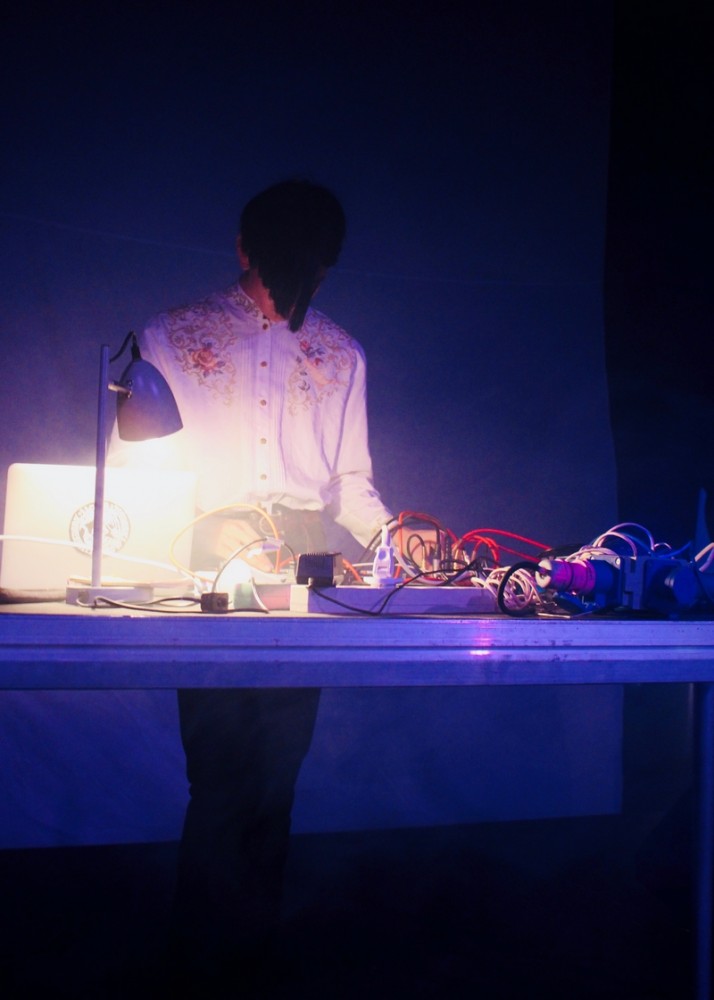
While Shattered Form remained hidden, and practically invisible behind his machines, Dominika exuded a strong, magnetic stage presence. Pacing around on the stage, driven and restless, Dominika reminded me of a wild animal caught behind bars: Full of instinctive energy, and a longing for primordial freedom. This longing also expressed itself in a vocal performance replete with wails and screams, set against broken beats and threat-inducing samples (the barking of dogs featured prominently at some point). A highly dramatic act who would suddenly break out into lamenting, hopeless love-songs, Dominika is the perfect soundtrack to a broken heart.
With the next act, Yuri, it became clear to me how well-balanced and thought-through the playing order at Lost Lands was: Physically highly active, very visible and engaging artists alternated with musicians who were closed-off and abject on stage. Yuri belongs to the latter camp, playing a set where the music was as subdued as her stage presence. An invitation to let the mind wander. Drenched in reverb, the slow-building synths and dripping drum-machines turned the concert venue into a glacier cave. Atmosphere reigned above all in these sparsely arranged, yet highly dense pieces.
This was yet again countered in the following concert by Céci. Heavy on performance, she combines on-point dance moves, pop-leaning lyrics, wordless voices and jagged rhythmical abstractions into one bitter-sweet, clashing whole. Futuristic RnB that is relatable without ever selling itself cheap, and where the performance is indistinguishable from the performer’s body.
Well-fed from the vegan and organic food available at the festival (served in 100% bio-degradable cups and cutlery), I was ready for Loft from the UK who gave me a good, solid laugh. The concert reminded those distraught with the deadpan seriousness that is so rampant in electronic music that music can actually be fantastical fun. Using a microphone to comment live on fuck-ups with the hardware, to share useless details about the music, and to joke about the act of being on stage as a whole, the show demonstrated not only musical prowess, but also a healthy distance from the performer to their own performance. The concert played out as a massive onslaught of energy and odd inventiveness. Heavily cryptic nods and references to the whole of British Club Music of the 90s and 00s collided with restless beat programming. Before long, Loft had the audience either dancing or shazaaming.
In a later interview, I brought up the role of the microphone in the performance. Loft explained that it is a way of commenting on the process while it is happening on stage. The conversation quickly moved to British standup comedian Stewart Lee who Loft cites as a major influence, which indeed was strongly palpable in the live performance. As a performer, Stewart Lee is known for using the life of a standup comedian and comedy itself as his main topics, up to the point of having released books where he describes the gestation of his jokes and his performances in great and hilarious detail (take the book “How I escaped my certain fate” as a recommendation). Stewart Lee is prone to pointing out the mechanics and the weaknesses of his own performances on stage, and so is Loft. But Loft does not simply ape this method. This particular way of performing is informed by a mind that is highly alert, active and aware of context. Spicing up his life concerts with comedic injections, and always aware of the act of performing, Loft is both deconstructing the stage persona as well as being immensely fun.

This fun element was picked up by next act, Ivy: A model and spokesperson for the transgender community, Ivy played a concert of over-the-top hyper-R&B that was engaging and driving, yet palpably critical of established gender roles in contemporary club music. But always with a love for glamour.
With the next concert, the audience was allowed to unwind a bit from the high tension created by the previous acts. Torus from the Netherlands takes feelings and emotions as the starting point for his compositions. Contemplative and highly-stylized pieces are the result. These are deeply personal, often employing sounds and samples that have a strong personal meaning for Torus. In the performance, scattered sounds of every-day life folded into mellow, soothing melodies.
This dreamy act tied in well with the next concert: Something about Dinamarca’s concert reminded me of the old video-game classics I used to play as a child: Playful music that is arranged tightly and tells a story without intruding or imposing itself. Smooth, laid-back reggaeton rhythms are paired with decidedly artificial synths, to a hypnotically shuffling result. Highly evocative!
The end of day 1 was marked by a DJ set by Kasper Marott, who played gliding, housey tunes. Kasper Houmøller Mortensen, one of the organizers of the festival, had described to me that he wanted to create a space for what he called ”apocalyptic hippies”. And it had worked: Taking a look around, you could see that a lot of the audience were true butterflies of the night, out in full regalia, each one of them a regent in their own fantastical kingdom. ”What are these people doing at daytime?“, I wondered. But it didn’t matter. Night had long fallen. And night always seems infinite.

The following day coincided with the main festivities of Copenhagen Pride. Moving through the city on this day reminded me of how effortlessly multi-faceted Lost Lands was: There, I never saw the Pride colours once, while the Rainbow Flag was all over Copenhagen. However, it was clear that Copenhagen Pride has become a street-event like any other. I honestly didn’t see a big difference between Copenhagen Pride and St. Patrick’s Day: Drunk people waving flags that have nothing to do with them. Just another opportunity for a beer.
This problematic development takes the subversive potential of the Pride movement, and neutralizes and incorporates it for goals which are alien to the actual movement. What does it tell you when 7-Eleven stores are sporting the
Rainbow Flag? Is Copenhagen Pride becoming a false flag operation? Who is actually expressing themselves here? Highly dubious. On my way to Refshaleøen, I see a man cycling, a massive handwritten sign attached to his bike: „QUEER EQUALITY, NOT RAINBOW CAPITALISM“. Yes, please!
Why am I mentioning this? Because Lost Lands also excelled at the values of inclusion and equality. The festival transcended its aim for manifold music, into a social vision as well, creating a space where everyone was welcome, and only offensive behaviour would be frowned upon.
Multiplicity, not duplicity. These goals were lived naturally, and never had to be crammed in your face. Copenhagen Pride seemed to be attended by a lot of people who simply have no connection to the Pride values. At Lost Lands, I saw people who naturally see tolerance as a core value.
Pondering these questions, I arrived for the second day of the festival. We got a smooth start that day with an ambient concert by Miro: Clouds of delayed tones mingled with arpeggios that created a floating soundscape. Miro writes his own, partially autonomous software for creating music, working with his ideas and sketches in a modular way. This makes for performances which cannot be replicated, as the software makes decisions on its own. Drones, complemented by gently dripping melodies, shifted in and out of the audible range. The concert came full circle, ending on the same note as it started. The audience was left in a dream state.
A state that was abruptly broken by the following performance. Fatäk entered the outdoor stage, and I was not prepared: A high-intensity concert in constant motion started. Splicing the digital with the natural, Fatäk is clearly in charge of her instruments. Making full use of the frequency spectrum, Fatäk sends the listener on a cathartic emotional journey. Starting with slowly droning natural sounds, she burst out into a scream that was instantly warped and shattered by her excellent work on her effects units. Simultaneously organic and hyper-artificial, she played brutal, yet crystal-clear rhythms, combined in a free-form manner. Immediate, but never lenient. With her music, she is dancing along the edge of the void, yet always in full control of herself. Chaos is allowed allowed in, but Fatäk never succumbs to it. She remains in charge, and knows how to harness the chaos, owing to her deep understanding of the hardware and software she uses. But it is her vocal work that ties it all together, reminding the audience that every good concert also is a ceremony. Poetry and theatre, composition and improvisation all came together, solidifying into a unique and highly personal performance.
Within minutes, it became clear that there was a strong dramatic understanding at work, a sense for development and story-telling. I instantly knew that she would also know how to bring it all home, and how to end the concert well. She did, with a great sense of timing and balance. This concert was a ceremony, sincere and open, yet never naive, taking the audience through distress and despair to a relieving resolution. Artistic maturity and innocent, exploratory curiosity intersected to truly impressive results with this performance.
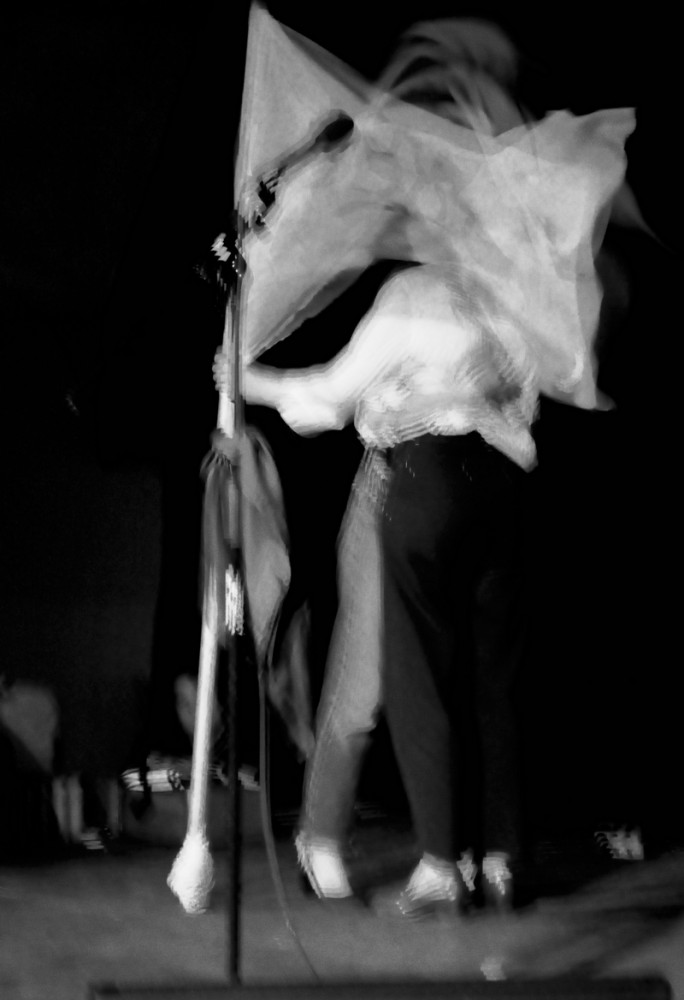
The ceremonial momentum was picked up by Soho Rezanejad. In a special performance, she played a vocal piece in dedication to Swedish journalist Kim Wall, who was murdered one summer ago by Peter Madsen, entrepreneur, scientist, and psychopathic killer. The killing happened in Madsen’s own submarine. This submarine had been housed in the very same hall where the concert was held, charging the atmosphere with an eerieness beyond time. Rezanejad chose not to mourn the death of Kim Wall, but to celebrate her lifetime of outstanding achievements. In fact, Soho Rezanejad was scheduled to take a trip on the same submarine with Peter Madsen, a plan cut short by the killing. Adorned by incense burning, the ceremony was elegic and solemnly festive. Aesthetically, it reminded me of the late works of German chanteuse Nico, sharing a sensitivity for a dream-like and magnetic story-telling.
The night was loosened up by next act, Schultz & Forever. Well-placed within the line-up, they softened up the tension with their songs, radiating warmth, straight from and straight to the heart. I am sensing an intricate understanding of the interplay between the personal and the persona here. Schultz & Forever assume a particular stage persona that allows to channel and to communicate emotions on a very direct level.
This also softened up the audience, making them even more vulnerable, in an almost sinister act of curating: Roly Porter mounted the stage, with a live-set geared towards annihilation. Cutting and merciless, his set sucked the air out of the room. Launching controlled bursts of pristine noise that go straight to the nervous system, Roly Porter offered no reconciliation. Sound waves are fired off only to collide with one another. Even the silence in between those bursts seems to twitch. With a great sense of timing, these screeching onslaughts conjure up a world that has obliterated humanity. Total discoordination in the listener is the result. However, this discoordination is meticulously planned and executed. Towards the end of the performance, the submerged melodic elements that had only been hinted at earlier finally fought their way through to the forefront of the mix, leaving every present mind buzzing. This is almost cinematic in its grandiose demeanour. And with its nihilistic, techno-dystopian sound, beyond harmony or temperature, the music of Roly Porter would make a great accompaniment for reading Ted Kaczynski’s manifesto „Industrial Society and its Future“.

People would need a break after this, and it was clear that the people behind Lost Lands knew this too, ushering in Misery as the next act. Sincere and open, their well-designed, icy pop songs gave the audience a chance to come down and regain orientation again. Guitar and voice intertwined, playing around one another, and Misery performed a set of honest, romantic longing.
It had been a heady day so far, when Kowton entered the stage, gracing the audience with a heavy set of solid UK Bass that showed a clear love for the classic drum machines. CR-78, LinnDrum, TR-808 and 909 reigned supreme in a set that married stomping beats and punchy basslines, gradually moving into more complex, poly-rhythmic territory.
The night continued with fast techno from E-Saggila who blended faded emotional bleakness with a rough staccato kick drum massacre, cold and overheated at the same time.
This festival had been an awe-inspiring blend of bold music, held together by the team of Lost Lands, who demonstrated that disparate music from the edges of the genres can function perfectly when balanced well together. Lost Lands has been a full success, its aim of bringing music enthusiasts, party animals and recreationalists together for two days of experimental music, free from any dogmatic pressure. A great opportunity has been created for seeing established names in the field of experimental music next to acts only known to the local connoisseur.
This egalitarian spirit also showed itself in the posters for the festival, which never labelled any act as „live“ or „DJ“: These would also only be categories muddying what is really important: The music itself.
The festival reminded me of a familiar spirit from my hometown Berlin: A group of people, driven by nothing else but love for music, get together to create a temporary space for a few days of great concerts and partying, free and idealistic like Robin Hood and his band of thieves. I am looking forward to next year.
